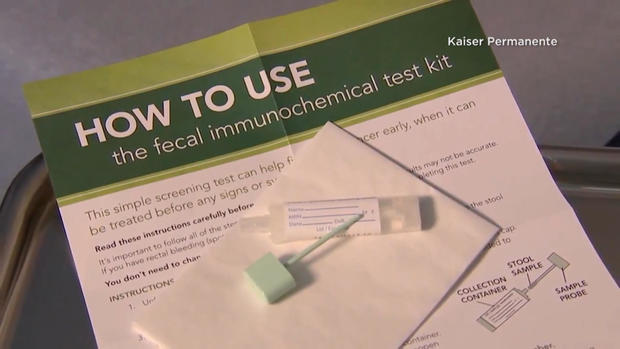At-home test effective for colon cancer screening, study finds
Colon cancer is one of the most common cancers diagnosed in both men and women in the United States, but many people who should be getting screened for it aren't. New research suggests there may be a solution for that: at-home screening tests.
The review, published in the Annals of Internal Medicine, looked at 30 studies on annual at-home tests called FITs (fecal immunochemical test) and found that they are effective for colorectal cancer screening in average risk people. The home test kit can be ordered by a family doctor and involves collecting a small amount of feces with a swab and sending it to a lab for analysis.
"There are different ways of getting screened. One of them is the colonoscopy and that is a great choice for a lot of people," said CBS News chief medical correspondent Dr. Jon LaPook. "But for the people who don't want the colonoscopy, know that there are alternatives. One of those alternatives is the FIT test and that is looking for invisible blood that is in the stool."
Blood in the stool may be an early symptom of colon polyps, or growths in the lining of the colon or rectum, or of colon cancer.
Currently, only 65 percent of people who should be getting screened for colorectal cancer are doing so. LaPook, who is a gastroenterologist, says the hope is that access to less invasive and intimidating tests will increase screening rates.
"The main highlight here is that FIT seems to be a pretty good test for picking up colon cancer. It's a less good test for picking up colon polyps but it certainly beats doing nothing," he said.
With colon cancer increasing in younger people, last year the American Cancer Society began recommending average-risk adults start screening at age 45 instead of 50.
According to the American Cancer Society, people are considered average risk if they do not have:
- A personal history of colorectal cancer or certain types of polyps
- A family history of colorectal cancer
- A personal history of inflammatory bowel disease like ulcerative colitis or Crohn's disease
- A confirmed or suspected hereditary colorectal cancer syndrome, such as familial adenomatous polyposis or Lynch syndrome (hereditary non-polyposis colon cancer)
- A personal history of getting radiation to the abdomen or pelvic area to treat a prior cancer
The researchers from the new report point out that while the colonoscopy is considered the gold standard for colon cancer screening in the U.S., in other countries like the U.K., Canada, and Italy, it is only performed in average-risk individuals with no symptoms if their FIT results are positive.
Patrice Brown with the Colorectal Cancer Alliance reminds people to look out for symptoms and to know your risk factors.
Common symptoms are changes in bowel habits, changes in stool consistency, blood in the stool, and abdominal pain.
Risk factors include family history, obesity, inactivity, smoking, and a diet high in red and processed meats.
And since colorectal cancer is one of the most curable types of cancer if it's detected early, Brown also urges everyone to follow the recommendations for getting screened.
"Our motto is the best test is the test that gets done regardless of method," she said.




